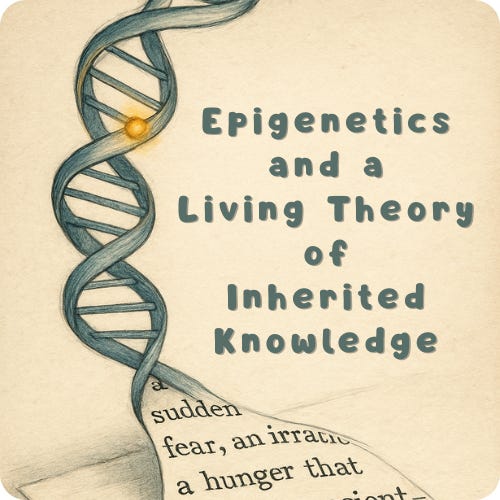The Ghost in Our Genes
Epigenetics, Ancestral Trauma, and the Lingering Mystery of Genetic Memory—A Living Theory for Writers and Wonderers Alike
Some wounds aren’t ours, yet we carry them.
A sudden fear. An irrational shame. A hunger that feels ancient—written not in storybooks, but somewhere deeper.
For centuries, we’ve had names for this: ancestral trauma, blood memory, original sin, inherited sorrow. And now, through the slow chisel of science, we begin to see traces of these ghosts—not in our genes themselves, but in how those genes are expressed.
Epigenetics, the study of chemical markers that silence or amplify gene activity, has shown us that trauma doesn’t always end with the survivor. It can echo through generations. And while “genetic memory” isn’t yet embraced by formal science, it may be what poetry and intuition have whispered all along—that memory moves in more ways than we know.
For fiction writers, this opens a thrilling doorway:
What if our characters carry not only their own wounds, but the emotional residue of those who came before?
What if their fears, fixations, or desires didn’t begin with them?
Suddenly, we gain access to a whole new depth of conflict—not just psychological, but epigenetic, ancestral, soul-level.
What Epigenetics Actually Says
Jean M. Auel was the first to introduce me to the idea of inherited knowing. Through her extensively researched Earth’s Children series—especially Clan of the Cave Bear—Auel planted the seed that trauma and survival instincts might be passed down not just culturally, but internally.
That was 1980.
Today, research suggests that Auel and Ayla may have glimpsed something long before the scientific world was ready to see it: epigenetics.
In short, epigenetics is “the study of heritable changes in gene function that do not involve alterations to the DNA sequence.” We’re not talking about mutations, but about chemical “tags”—like DNA methylation or histone acetylation—that influence how genes are expressed. These tags can effectively switch genes on or off, altering how our bodies respond to the world.
The critical part? Some of these epigenetic marks can be passed on to future generations. Plural.
A great-grandchild may experience the psychological or physical effects of war, famine, slavery, or abuse without ever having experienced it firsthand.
Trauma That Echoes: Real-World Evidence
The Dutch Hunger Winter
In 1944–45, a Nazi blockade cut off food supplies to the western Netherlands. Pregnant mothers consumed fewer than 600 calories per day. Studies show that babies exposed to famine in utero had significantly higher risks of diabetes, schizophrenia, and metabolic disorders later in life.
But the haunting twist? These effects appeared in their children and grandchildren as well.
The Swedish Famine Studies
The Överkalix study found similar intergenerational impacts. A grandfather’s experience of famine during pre-adolescence could influence the mortality risk of his grandchildren—particularly through the paternal line.
Animal Studies: Agouti Mice and Daphnia Helmets
In mice, the agouti gene controls coat color and weight. Environmental triggers—like diet—can activate this gene, leading to yellow fur, obesity, and higher cancer risk. Offspring of these mice often show the same traits, even without exposure to the original trigger.
In water fleas (Daphnia cucullata), exposure to predator cues in the womb leads to the development of a protective helmet. And like the agouti mice, this trait has appeared in subsequent generations—even without predators present.
So … if a venomous reptile struck one of my Neanderthal ancestors, did it trigger methylation that embedded a fear of snakes in my bloodline?
Science doesn’t know for sure—yet.
But it’s asking the question.
Intuition or Inherited Memory?
Mark Wolynn, in It Didn’t Start With You, explores how inherited family trauma can shape how we think, feel, and navigate the world. He proposes that some of our deepest emotional wounds may not stem from our own life experiences, but from the unresolved grief of parents, grandparents, and great-grandparents.
From a therapeutic lens, this offers profound insight.
From a fiction writing lens—it’s a narrative goldmine.
If trauma can be inherited … can fascination be inherited too?
Could a character’s ability to speak with stars, or feel drawn to the sea, be the echo of someone who came before?
Ask Red.
Ask Jayla.
Maybe even Zophia.
(If you’ve read Starwoven: Hear My Call, you’ll know exactly what I mean.)
The Writer’s Thread
For character-driven writers, incorporating inherited trauma (and inherited wonder) opens a vast new realm for backstory and character development.
Why does this character fear water—and why can’t she explain it?
Why does he sabotage every relationship that gets too close?
Why does this child draw maps to places she’s never seen?
These are not just quirks. They may be inherited stories, lived once by someone else and passed down as instinct, dream, or silence.
What’s Next
Next week, we’ll dive deeper into the distinction between genetic memory and transgenerational knowledge inheritance—and how silence, omission, and cultural rupture can shape character just as powerfully as DNA.
But for now …
What about you, dear Reader?
Do you suspect you carry methylated memory?
What knowledge—joyful or painful—do you imagine you’ve inherited from your ancestors?
And how might it shape the stories you tell, or the ones still waiting to be told?






This resonates with me deeply. I often call on my ancestors to write with me or to see through my eyes, and I feel they are with me as I continue the cycle with healing in mind, all of us knowing the pain of past violence while simultaneously feeling love and joy. Time is not holding us :)
It’s funny I just wrote something about this as a feeling. I call it a lingering Déjà vu that just seems to follow you. Pretty interesting to think about!